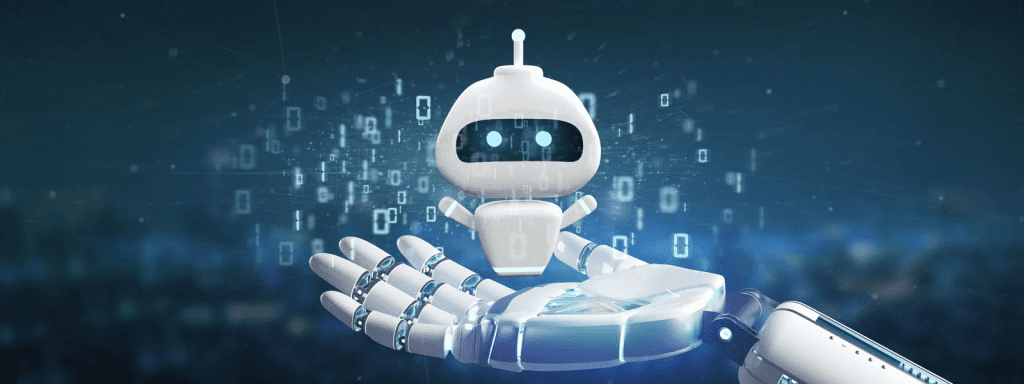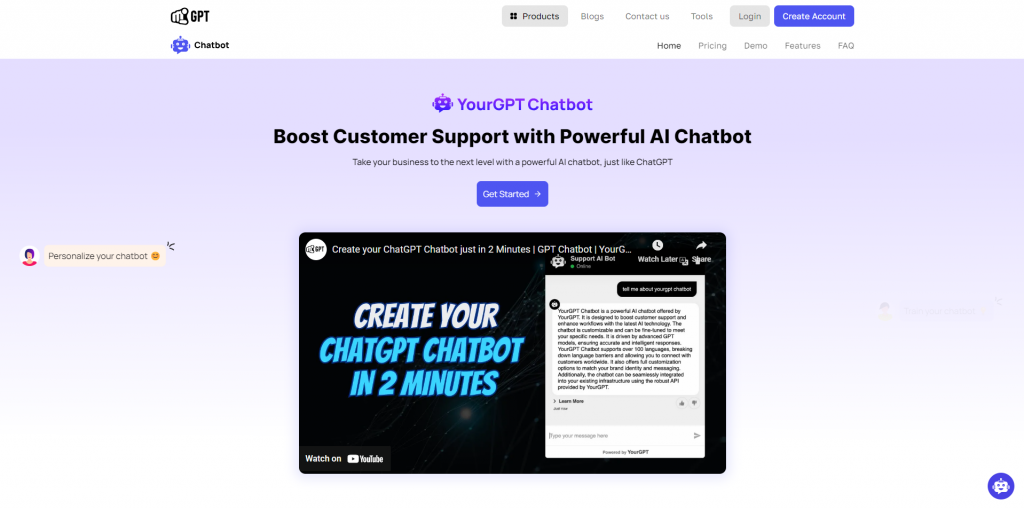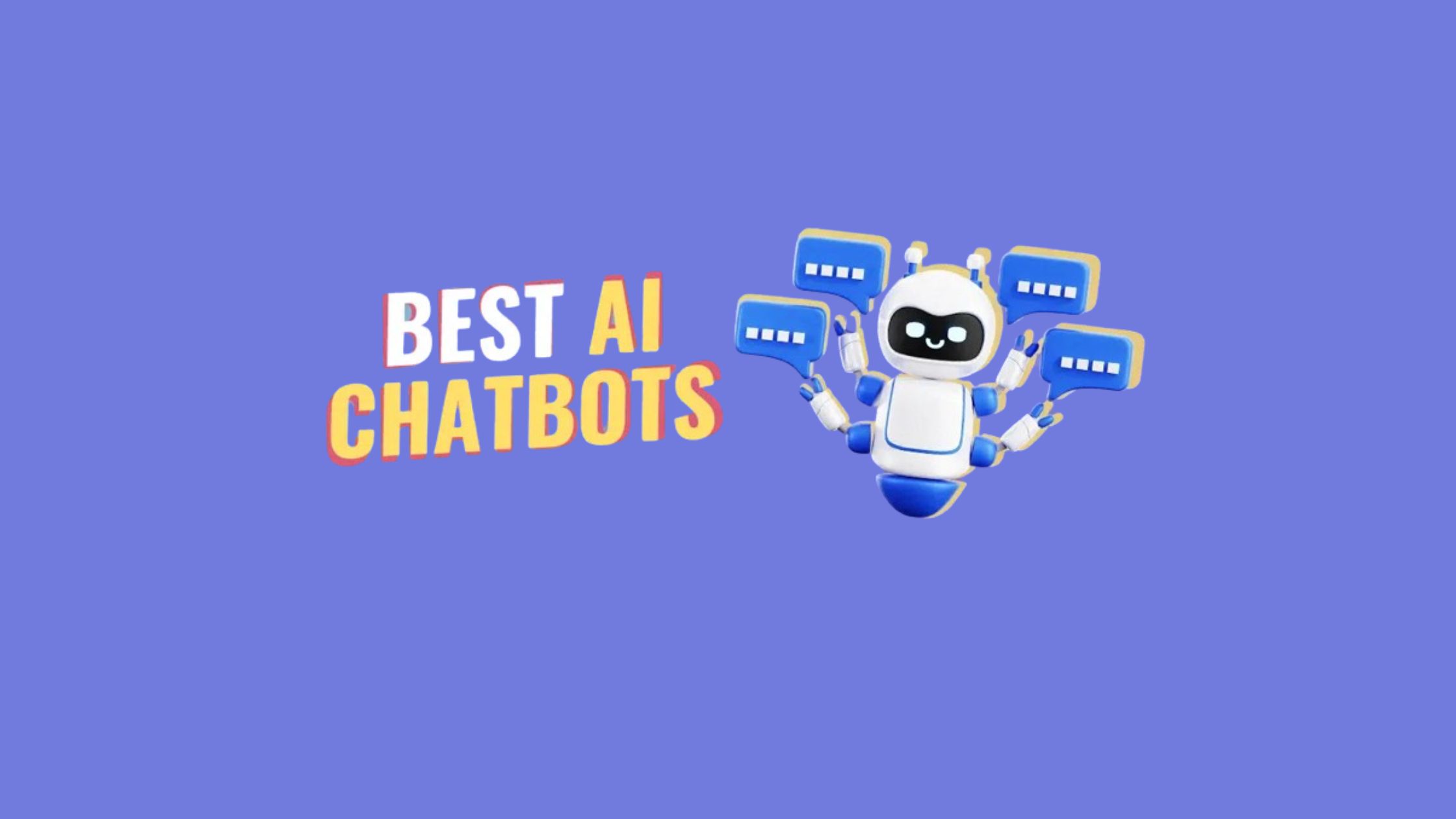In 2024, 85% of customers prefer managing their interactions with businesses independently, without human assistance. They seek self-service options that are available 24/7 on their preferred channels. This shift in customer expectations has driven the rapid growth of chat and messaging platforms, allowing businesses to meet these demands effectively.
With a wide range of AI chatbot solutions available, each offering different features and pricing, choosing the right one can be daunting. To simplify your decision-making process, we’ve analyzed top chatbot providers to highlight the best options for various business needs.
Keep reading to discover the ideal chatbot solution for your business!
What Is an AI Chatbot?
An AI chatbot is a software application powered by artificial intelligence, designed to interact with users through natural language. These chatbots are equipped with algorithms that allow them to understand and respond to text or voice inputs as if they were human. By utilizing technologies such as machine learning and natural language processing (NLP), AI chatbots can manage a wide range of tasks—from answering customer queries to handling transactions—making them a valuable asset for businesses seeking to provide efficient and personalized service.

1. YourGPT Chatbot: The Leader in AI-Powered Customer Engagement
YourGPT tops our list, standing out as a versatile and user-friendly AI chatbot. It leverages cutting-edge AI technology to deliver highly personalized interactions. With its advanced natural language understanding, YourGPT Chatbot can handle complex queries effortlessly, making it an ideal choice for businesses focused on providing top-tier customer support. YourGPT’s ability to integrate seamlessly across various platforms ensures it can adapt to diverse business needs, from customer service to sales and beyond.
Pros:
Versatile and User-Friendly: Adaptable across various platforms and business needs.
Advanced Natural Language Understanding: Handles complex queries effortlessly.
Seamless Integration: Easily integrates with different systems, enhancing overall efficiency.

2. Drift: Real-Time Engagement That Drives Sales
Drift is renowned for its ability to facilitate real-time conversations, making it a powerful tool for driving sales and engaging website visitors. Its AI-driven insights and lead qualification features help businesses convert visitors into potential customers. Drift’s seamless integration with CRM systems ensures that all interactions are tracked and managed effectively, offering a comprehensive solution for improving customer engagement.
Pros:
Real-Time Conversations: Excellent for driving sales and engaging website visitors instantly.
AI-Driven Insights: Helps convert visitors into potential customers through lead qualification.
CRM Integration: Tracks and manages interactions effectively within CRM system.
Cons:
Limited Customization: May lack flexibility in certain features for more niche businesses.
Steep Learning Curve: Requires time to fully leverage its potential, particularly for beginners.
3. Intercom: Seamless Integration of AI and Human Support
Intercom offers a robust customer messaging platform that combines AI chatbots with human support. Its intelligent automation and routing features enable businesses to provide timely and relevant responses to customer inquiries. Intercom’s chatbot enhances user experience by delivering personalized interactions and transitioning smoothly between automated and live support when necessary.
Pros:
Intelligent Automation: Ensures timely and relevant responses to customer inquiries.
Smooth Transition: Effortlessly moves between AI and human support when necessary.
Personalized Interactions: Enhances user experience with tailored responses.
Cons:
High Cost: Pricing can be steep, especially for small businesses.
Complex Setup: Initial setup may require significant time and resources.
4. HubSpot: Streamlining Customer Interactions
HubSpot’s AI chatbot is integrated into its broader marketing and sales platform, providing businesses with a unified solution for managing customer interactions. Its automation features, such as lead capture and scheduling, help streamline processes and boost efficiency. HubSpot’s chatbot is known for its user-friendly interface and ability to deliver personalized responses based on user behavior.
Pros:
Unified Platform: Integrated with HubSpot’s broader marketing and sales tools.
Efficient Automation: Features like lead capture and scheduling streamline processes.
User-Friendly Interface: Easy to use, even for those without technical expertise.
Cons:
Feature Limitations: Some advanced features may be restricted to higher-tier plans.
Integration Issues: May have limited compatibility with non-HubSpot tools.
5. Ada: Personalized Customer Experience at Scale
Ada specializes in delivering highly personalized customer experiences through its AI chatbot. Leveraging advanced natural language understanding, Ada’s chatbot provides contextually relevant responses and handles a wide range of inquiries. Its customizable chat flows and intuitive interface make it a popular choice for businesses looking to enhance customer satisfaction and engagement.
Pros:
Highly Personalized: Provides contextually relevant responses tailored to individual users.
Customizable Chat Flows: Offers a high degree of customization to fit specific business needs.
Intuitive Interface: Easy to use, making it accessible for various types of businesses.
Cons:
Limited Integrations: May not integrate well with all third-party systems.
Cost: Advanced customization options may come at a higher price.
6. LivePerson: Managing Conversations Across Channels
LivePerson’s AI chatbot excels in managing conversations across multiple channels, including websites, mobile apps, and social media. Its machine learning algorithms enable it to understand and respond to complex queries, providing a human-like interaction experience. LivePerson’s chat bot is designed to enhance customer support by offering accurate and timely responses.
Pros:
Multi-Channel Management: Handles conversations across websites, mobile apps, and social media.
Human-Like Interactions: Machine learning algorithms provide sophisticated query handling.
Timely Responses: Designed to enhance customer support with quick and accurate replies.
Cons:
Complex Implementation: Setup and management can be challenging for smaller teams.
Price: May be more expensive compared to other chatbots with similar features.
7. ManyChat: Social Media Engagement Simplified
ManyChat specializes in AI-driven chatbots for social media platforms, particularly Facebook Messenger. Its chatbot helps businesses automate interactions, send personalized messages, and engage users through interactive content. ManyChat’s platform is known for its ease of use and effectiveness in driving user engagement on social media.
Pros:
Specialized for Social Media: Particularly effective on platforms like Facebook Messenger.
Automated Interactions: Streamlines user engagement with personalized messaging.
Ease of Use: User-friendly platform ideal for businesses of all sizes.
Cons:
Limited Scope: Primarily focused on social media, lacking broad application.
Feature Restrictions: Some features are only available on paid plans.
8. Botpress: Customizable Open-Source AI Chatbot
Botpress is an open-source chatbot platform that offers businesses the flexibility to build custom AI chatbots. Its modular design and developer-friendly tools make it an excellent option for creating tailored solutions. Botpress’s AI chatbot supports natural language understanding and provides a highly customizable user experience.
Pros:
Highly Customizable: Open-source platform allows for tailored chatbot solutions.
Developer-Friendly: Offers modular design and tools for advanced users.
Natural Language Understanding: Supports complex interactions and queries.
Cons:
Technical Expertise Required: May not be suitable for non-technical users.
Maintenance: Requires ongoing updates and management, which can be resource-intensive.
9. Zoho Desk: Enhancing Customer Support Efficiency
Zoho Desk’s AI chatbot is designed to improve customer support by automating routine tasks and providing instant responses. Its integration with Zoho’s suite of business applications ensures a seamless experience for managing customer interactions. The chatbot’s capabilities include sentiment analysis and contextual understanding, enhancing the quality of support provided.
Pros:
Automated Support: Improves efficiency by automating routine tasks and providing instant responses.
Seamless Integration: Works well with Zoho’s suite of business applications.
Advanced Features: Includes sentiment analysis and contextual understanding for better support.
Cons:
Limited to Zoho Ecosystem: Best suited for businesses already using Zoho’s tools.
Feature Access: Some advanced features may only be available on higher-tier plans.
10. Tars: Boosting Conversions with Conversational Landing Pages
Tars focuses on creating conversational landing pages that boost conversions and engage users. Its AI chatbot guides users through customized experiences based on their preferences and behavior. Tars’s platform is known for its interactive and engaging chat experiences, making it a valuable tool for businesses looking to improve customer engagement.
Pros:
Conversion-Focused: Designed to boost conversions through interactive and personalized chat experiences.
User-Friendly Interface: Easy to set up and use, making it accessible for all business sizes.
Customizable Experiences: Guides users through customized journeys based on their behavior and preferences.
Cons:
Niche Application: Primarily focused on landing pages, limiting broader usage.
Feature Limitations: Some advanced functionalities may require higher-tier subscriptions.
Feature Analysis: Why YourGPT Leads the Pack
1. Natural Language Understanding (NLU)
YourGPT stands out with its superior NLU capabilities, making it highly effective in understanding and processing complex queries. This advanced feature ensures that the chatbot can engage in more meaningful and accurate conversations, providing users with precise and helpful responses.
2. Personalization
YourGPT offers unparalleled personalization, tailoring interactions based on user data and past interactions. This level of customization allows businesses to create highly individualized customer experiences, which is crucial for enhancing customer satisfaction and loyalty.
3. Ease of Integration
Seamless integration is a key strength of YourGPT. It can easily connect with various platforms and tools that businesses are already using, such as CRM systems, marketing automation tools, and customer support software. This flexibility reduces the need for additional infrastructure, making it a highly adaptable solution.
4. Multi-Channel Management
While LivePerson excels in managing conversations across multiple channels, YourGPT is not far behind. It effectively handles interactions across websites, mobile apps, and social media platforms, ensuring consistent customer engagement wherever users are most active.
5. Customization
YourGPT offers extensive customization options, allowing businesses to tailor the chatbot to their specific needs. Whether it’s the design of the chat interface or the tone of communication, YourGPT can be adapted to reflect the brand’s identity and voice.
6. User-Friendliness
YourGPT is designed to be intuitive and easy to use, even for those with minimal technical expertise. This makes it accessible for businesses of all sizes, ensuring that they can deploy and manage the chatbot with ease.
7. Cost-Effectiveness
Despite its advanced features, YourGPT is priced competitively, offering excellent value for money. Its ability to deliver a high return on investment (ROI) through improved customer engagement and satisfaction makes it a cost-effective choice for businesses.

Conclusion:
As we move through 2024, AI chatbots continue to revolutionize customer engagement by providing innovative solutions for businesses. The ten chatbots highlighted in this blog represent the forefront of this technology, offering a range of features designed to enhance interactions, drive conversions, and improve overall customer satisfaction. From the versatile capabilities of YourGPT to the specialized functionalities of other top-rated chatbots, these tools are setting new standards in customer engagement and paving the way for a more connected and responsive digital experience.
FAQ:
1. What are the key benefits of using AI chatbots for customer engagement?
Answer: AI chatbots enhance customer engagement by providing 24/7 support, handling complex queries, personalizing interactions, and managing conversations across multiple channels. They streamline processes, improve customer satisfaction, and free up human resources for more critical tasks.
2. How does YourGPT stand out among other AI chatbots in 2024?
Answer: YourGPT stands out for its superior natural language understanding, high-level personalization, seamless integration with various platforms, extensive customization options, and user-friendly design. It offers a versatile solution that can adapt to different business needs, making it a top choice for enhancing customer engagement.
3. Are AI chatbots difficult to implement and manage for businesses?
Answer: Implementation and management difficulty can vary depending on the platform. While some AI chatbots like YourGPT and ManyChat are designed to be user-friendly and require minimal technical expertise, others like Botpress may require more technical knowledge for customization and ongoing maintenance.
4. Can AI chatbots handle complex customer queries effectively?
Answer: Yes, AI chatbots equipped with advanced natural language processing (NLP) and machine learning algorithms, such as YourGPT, can handle complex queries effectively. These chatbots are designed to understand context, provide accurate responses, and even learn from interactions to improve over time.
5. How do AI chatbots contribute to driving sales and conversions?
Answer: AI chatbots contribute to driving sales and conversions by engaging users in real-time, providing personalized recommendations, automating lead qualification, and guiding customers through the purchasing process. Platforms like Drift and Tars are particularly effective in boosting conversions through interactive and targeted chat experiences.


Leave a Reply